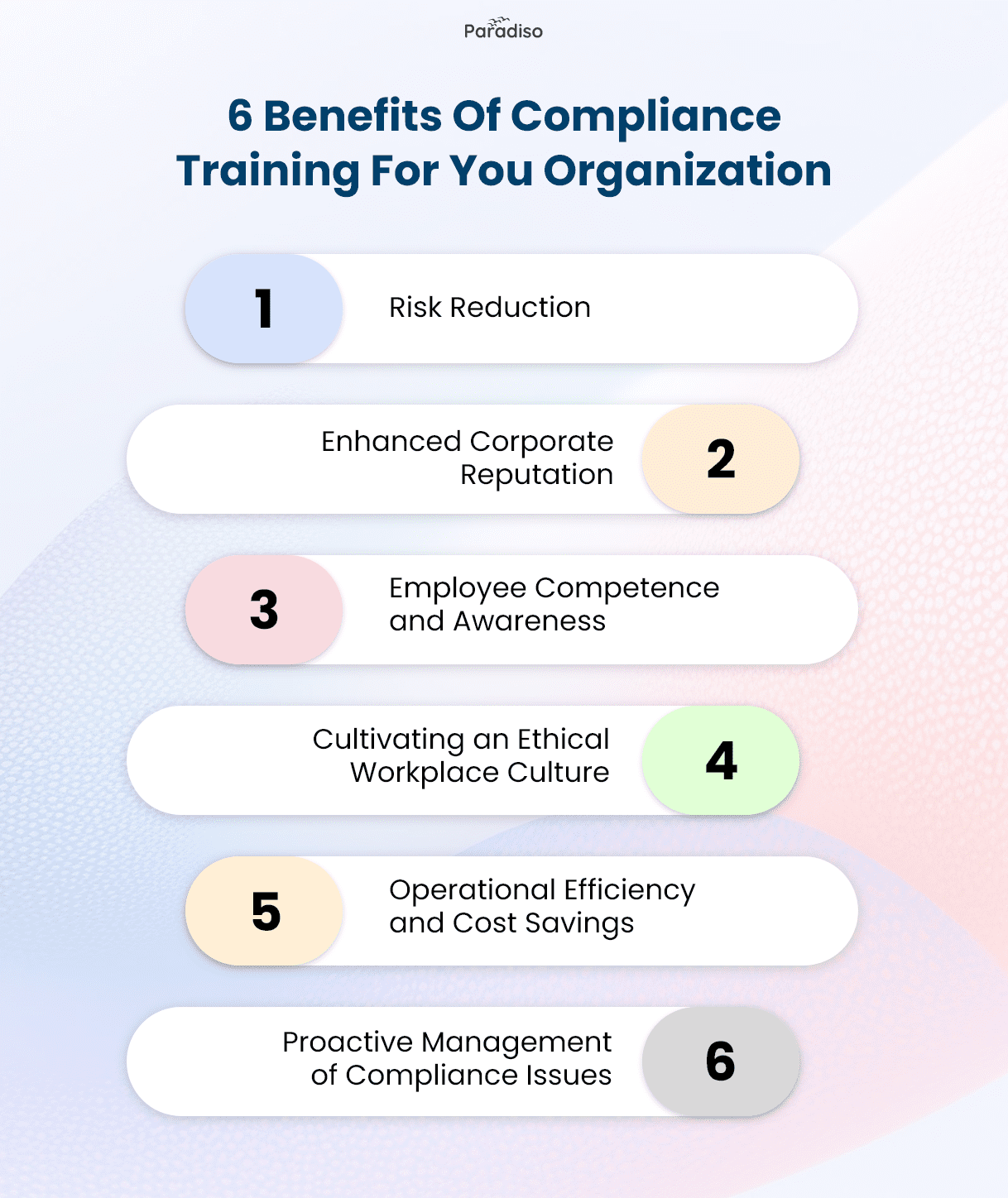The term “compliance” refers to accepting and agreeing, and the training is mandatory because it protects an organization’s values, policies, and commitment to the law. Disregarding required rules, regulations, or policies within an organization can have drastic consequences, including loss of employment, fines, criminal prosecution, audits, or damage to the business’s reputation. This is where compliance training is needed to inform employees of the organization’s regulations, policies, or adherence to laws ensuring that an organization has secured legal accountability.
Why is compliance training important?

For example, Information Security Training focuses on computer security, covering strong passwords, email scams, safe internet habits, and data handling. It ensures employees’ computer habits won’t put the organization at risk.
Workplace Safety Training puts a strong focus on fall protection, hazard communication, and machine guarding to ensure the safety and well-being of employees.
There are several types of trainings that are established in different industry sectors, but all of them share the same goal of preventing misconduct, reducing the risk of legal action against the organization, and promoting a safe, ethical, and legally compliant workplace environment.
What is Compliance Training?
Compliance training refers to the educational programs organizations implement to ensure employees understand and adhere to all laws, regulations, standards, and internal policies relevant to their jobs. This type of training is crucial in maintaining legal and ethical integrity within the workplace. It encompasses workplace safety, data protection, anti-harassment policies, financial regulations, etc. Compliance training is about educating employees to follow rules and regulations to prevent legal liabilities and foster a safe, respectful, and lawful work environment.
Insider Tips To Choose The Perfect Learning Management System
Download now to get insider tips on choosing the perfect Learning Management System!

Key Elements of Effective Compliance Training Programs
Creating an effective compliance training program requires more than just ticking off boxes. Here are some key elements that ensure your program is both comprehensive and engaging:
- Clear Objectives: Start by defining your compliance training goals. These goals should be aligned with the organization’s policies and regulatory requirements.
- Relevant Content: The training material should directly relate to the regulations and policies applicable to your industry and company. This makes the training more relevant and impactful.
- Interactive Learning: Use interactive elements such as quizzes, case studies, and scenarios to engage employees. This makes the training more exciting and helps reinforce learning through practical application.
- Regular Updates: Laws and regulations frequently change, so keeping your training content updated is vital. Regular updates ensure that your employees know the latest legal requirements.
- Accessibility: Ensure the training is accessible to all employees, regardless of their role or location. Online modules, mobile-friendly content, and flexible scheduling can help achieve this.
- Assessment and Feedback: Incorporate assessments to measure understanding and retention of the material. Please provide feedback to employees to help them improve and understand areas where they need more focus.
- Leadership Involvement: Leaders should endorse compliance training and actively participate. Their involvement emphasizes the importance of the training and sets a tone of commitment from the top.
6 Benefits of Compliance Training for Your Organization

Compliance training is not just about meeting legal requirements; it’s about building a solid foundation for long-term success. Investing in compliance training brings several advantages that extend beyond simply avoiding legal issues.
Risk Management
Effective compliance training helps organizations identify and mitigate risks before they escalate into significant problems. By educating employees about potential hazards and the importance of following regulations, companies can take a proactive approach to risk management. This can prevent costly legal battles, fines, and damage to the company’s reputation.
Healthy Reputation
Organizations known for their strong compliance practices earn the trust of customers, partners, and the public. A reputation for integrity and adherence to laws and regulations can lead to better business opportunities and increased customer loyalty. Clients and partners are more likely to engage with companies they perceive as responsible and reliable.
Operational Efficiency
Clear compliance guidelines and thorough training reduce ambiguity in daily operations. When employees understand the compliance requirements related to their roles, they can perform their duties more effectively and confidently. This clarity leads to smoother operations, fewer mistakes, and a more efficient workflow.
Employee Protection
Compliance training often includes essential safety and anti-harassment components, which help protect employees from harmful situations. Organizations can enhance employee morale and productivity by creating a safe and respectful work environment. Employees who feel secure and valued are likelier to be engaged and committed to their work.
Legal Protection
Comprehensive compliance training ensures that all employees are aware of their legal responsibilities. This knowledge significantly reduces the likelihood of legal issues arising and provides a stronger defense if any legal challenges occur. Well-informed employees are less likely to engage in behaviors that could result in legal repercussions for the organization.
Cultural Alignment
Compliance training helps embed the company’s values and ethical standards into the organizational culture. This alignment fosters a unified, ethical workforce committed to the company’s principles. When employees share a common understanding of the company’s expectations and values, it strengthens the overall culture and promotes a cohesive work environment.
Corporate Compliance Training Program Essentials
To build a robust corporate compliance training program, consider incorporating these essentials:
- Comprehensive Coverage: Ensure your training program covers all legal requirements and internal policies relevant to your industry and organization.
- Engaging Delivery: To cater to different learning styles, use a variety of delivery methods, such as e-learning modules, in-person workshops, webinars, and interactive simulations.
- Customizable Content: Adapt the training material to reflect the specific needs and context of different departments within your organization. This customization makes the training more relevant and effective.
- Ongoing Education: Compliance training should be a group event. Implement continuous learning opportunities to keep employees informed about new regulations and policies.
- Documentation and Tracking: Maintain thorough records of training completion and assessments. This documentation is crucial for demonstrating compliance during audits and legal reviews.
- Feedback Mechanism: Establish channels for employees to provide feedback on the training. Use this feedback to improve the program and address gaps or issues continually.
- Integration with Overall Strategy: Align your compliance training program with the broader business strategy. This integration ensures compliance is considered critical to the organization’s success, not just a regulatory requirement.
Insider Tips To Choose The Perfect Learning Management System
Download now to get insider tips on choosing the perfect Learning Management System!

What Makes Compliance Training Important
Compliance training is important for any organization aiming to minimize risks and enhance its operational integrity. Organizations can employ creative strategies to make compliance training engaging. Providing incentives or rewards for completing training can also motivate employees and foster a positive learning environment. By incorporating different elements, companies can make compliance training not just a requirement but a valuable and enjoyable part of professional development.
How Paradiso LMS Can Help
This is where Paradiso LMS comes in. Paradiso LMS offers an intuitive, user-friendly platform that simplifies the delivery and management of compliance training. With its customizable modules, interactive content capabilities, and robust tracking and reporting tools, Paradiso ensures a comprehensive and engaging learning experience. Its adaptability to various industries and scalability to suit different organization sizes make it a versatile choice.
By embracing Paradiso LMS, organizations can achieve a seamless, efficient, and practical approach to compliance training. This ensures your team is well-informed, compliant, and ready to excel. Trust Paradiso LMS to meet your compliance training objectives and transform the learning experience, making compliance training important and engaging for all employees.












